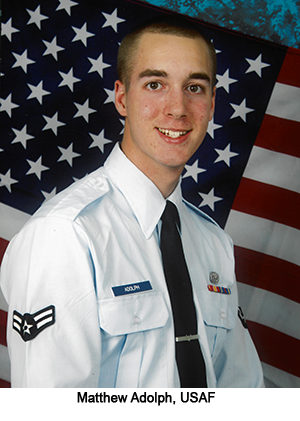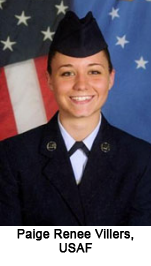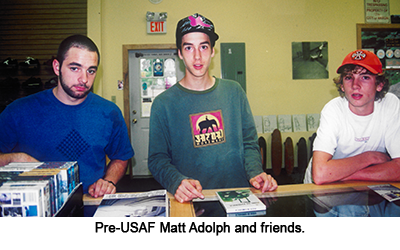A Letter for Paige
By Matthew Adolph
I didn’t know Paige, and for that I am sorry. We have so much in common it is extraordinary. I should have known her. We went to the same high school in Norton, Ohio. We even sat next to each other in several classes, but back then I was too shy to talk to her. After graduation, we took the same path in life. We joined the Air Force and went to basic military training within months of each other. We had the same recruiter, came from the same rural small-town, and had the same dream of getting out into the world and being independent. I should have gotten to know Paige before it was too late.

Paige Villers died while she was in basic training at Lackland Air Force Base in San Antonio, Texas. She died of a rare flu-like virus, the adenovirus on August 7, 2007. Over 100 recruits caught the virus at Lackland that year. In normal circumstances it would not have been enough to kill a healthy 19 year old, but in the stressful basic training environment her immune system was weakened. It was an abrupt and tragic end to a beautiful young woman’s life, and it came at a time when her journey through adult life was supposed to be just beginning. Since she died, I have gotten to know a lot about her from reading the articles written about her. I have learned that not only do we share the same background, but our personalities are so similar it is astonishing. I feel strongly connected to her since her fate could have been mine.
Her mother described her as quiet yet fiercely independent. When I was growing up I was the same way. Also like me, she dreamed of escaping the small-town existence of Norton. She was headstrong and determined. When she made her mind up to do something she would do it no matter how hard it was. She did not like to do what other people wanted, but she had moral courage and always stood up for what she knew was right. She worked a variety of jobs and never missed work or was late. She signed up for the Air Force in good faith in her country and gave it everything she had.
I was halfway around the world at my first assignment to Aviano Air Base, Italy when I learned of her passing. I worked at the base lodging facility’s front desk during my 2 year tour overseas. I opened a copy of Airman Magazine, an Air Force periodical, while on break at the base dining facility. Inside it, there was a touching article complete with colorful photos written about her. There was a picture of her in her dress blues for the graduation portrait.

She was smiling, healthy, and beautiful; she looked very well for being in the middle of basic training. Usually, by the time they take graduation pictures, recruits are pretty beaten down and sleep deprived. On the next page, in stark contrast, there were pictures of her in a hospital bed and in a wheelchair. She looked so sick, and so unlike the vibrant healthy version of herself from the previous photographs. She had just woken up after spending a month in a coma. Shortly afterwards, she would slip back into the coma and be taken off life support. The last picture was her family holding a flag and standing by her gravesite. I was completely shocked and deeply saddened.

I had to re-read it several times to sort out the details. I simply could not believe it was the girl from my hometown. At the time, Norton and everyone from it were far from my thoughts. I could not believe that a girl I went to high school with could already be dead. This was not supposed to happen. We were too young to die. I did not want to think about the reality of death and dying. I felt very vulnerable, and did not want to believe what I just read. I tried my best to push the thoughts about what happened to her out of my head. I spent the next few years trying to not think about what had happened.
On October 31, 2012 I finally finished my six year enlistment, and I moved back to Ohio. Since I have been out of the Air Force, Paige has been on my mind a lot lately. I realized that what happened to Paige could have happened to me. I often wonder how I made it through those six years. I had so many struggles and moments of self-doubt along the way. I remember how I felt when I did not even know if I would make it through basic training.
Like Paige, I also got very sick in basic, but fortunately I recovered. Two weeks before graduation I caught a virus. I can clearly identify the source. My flight and I were standing in the chow hall going through the serving line. Everyone has to stand shoulder to shoulder at the position of attention. You are not allowed to move, flinch, or adjust in any way. The recruit next to me was sick and coughing and sneezing in my face. The training instructor watched me to see how I would react. He was less concerned with the recruit spreading his germs all over the place than with us maintaining our military bearing. He wanted me to move so he could punish me with pushups. I did not have a choice, so I stood there and took it.
Sure enough, within a few days I became very sick as well. I felt feverish, and was coughing up my lungs. I had not gotten a full night of sleep in weeks. They push you to your limits, and it is a very high stress environment. You never get enough time to eat, sleep, or take care of your hygiene. You spend your whole day exercising in the heat and training. You have to adjust to an entirely new way of life. If another virus like the Spanish Influenza that killed millions comes about, it will be born in a military boot camp somewhere since the environment is perfect to create and spread one.
I was extremely sick, but I still had to train that week. They have a “sick call” for recruits to get medical attention but in practice it is rarely used. Officially, your training instructor has to let you go to sick call if you request it. However, in reality you cannot actually go because if you do your flight will punish you. It places extra stress on your flight for you to be gone so there is great pressure to not go. In our flight if you went to sick call, the flight leader would automatically schedule you for an extra shift of night dorm guard. So it becomes a scenario of would you risk getting two less hours of sleep on an already reduced schedule just so you can go to an overworked doctor and be pushed out with a couple cough drops and an ibuprofen? So, obviously, recruits tend to avoid going to sick call until it becomes a necessity. I did not go, and suffered through the next couple weeks feeling worse than I ever had.
Paige became sick during the field training portion of basic. During the field training weeks, recruits practice shooting their rifle, go through a gas chamber with tear gas, crawl through mud, and generally are miserable. The conditions out there are deplorable. You get no sleep, no shower, and no breakfast. At best you get two M.R.E’s (meals ready to eat) a day, which are consumed cold and spend your days marinating in mud and sweat. Paige went to the hospital when she became sick.
As is usual with Air Force doctors, they misdiagnosed her at first. The usual formula when they do not know what is wrong is to give you an ibuprofen, tell you have a cold, and send you back to duty. In her case they told her she had mononucleosis, which of course was a misdiagnosis and they sent her to medical hold. Unsurprisingly, she got much worse so they changed their diagnosis to pneumonia.
When they realized their mistake, they backpedaled to fix it. In typical Air Force fashion they rolled out every resource to help her. In come the best doctors and the state of the art medical techniques. Usually, the Air Force does not fix a problem until it is smacking them in the face. Then they hold nothing back to save face. If you ever find yourself in need of medical treatment in the Air Force it is preferable that you are bleeding out of a limb somewhere because, quite frankly, if your condition requires the doctor to investigate thoroughly to provide an accurate diagnosis, then you are sorry out of luck.
Paige slipped into a coma and the prognosis was not looking very good. Her parents were called and told she might not survive the night. She did, but she spent the next month in a coma. Remarkably, she eventually woke up from the coma and still had a clear memory of the events leading up to it. The Air Force held a graduation ceremony for her since she had already completed the requirements to graduate. In this regard, I am proud of them for honoring her in this way. She earned the title of Airman and brought honor to the uniform. Unfortunately, she slipped back into a coma a few days later and subsequently died within a couple weeks.
Sometimes I wonder whether she could have been saved. Granted, the Air Force took heroic efforts to save her life after they realized the seriousness of her condition; but, my gut instinct tells me it came too late. People have been known to survive the rabies virus which is even deadlier. The trick is to diagnose them quickly and put them in a medically induced coma. In Paige’s case I strongly suspect she had been sick with the virus for at least a week before she sought treatment. They actively discourage recruits to go to sick call. They tell you to suck it up. If they had identified the virus quickly and put her in a coma I think she would have made it.
Everyone expects military troops to die in war. No one expect military troops to die in basic training. It is so much more tragic because it is largely preventable. Sure basic training has to be hard. We have to make sure the people we send to war are fit for it but we should not have to sacrifice people in the process. I do not know what the solution is, but I know there should at least be a discussion. I am no longer a part of that world, but I care about the people that are in it. I know what it feels like to go through that struggle, and I want the troops to be taken care of.
I went to Paige’s gravesite last Friday to pay my respects. She is buried at the Ohio Western Reserve Cemetery in Seville. It is truly an idyllic place during this time of the year when the leaves are turning color. Her marker is located in a sea of uniform grey V.A. furnished headstones. I put flowers on her grave and took in the vast ocean of headstones. It is hard to imagine how many veterans from Ohio have died until you see the site firsthand.
Paige’s story has given me a lot to think about. It makes me feel blessed to be alive. Just to have made it out the other side with an honorable discharge and all my limbs intact. Sometimes I wonder whether there is a grand scheme to all of this. Why some people make it and others do not. Is it simply chance? I don’t think so. Is there a God? I don’t know, but I believe so. I think there is more to this than I can understand. Perhaps Paige was here to inspire others. She has inspired me.
Go here for the USAF article (PDF) about Paige.

 Our Plan
Our Plan